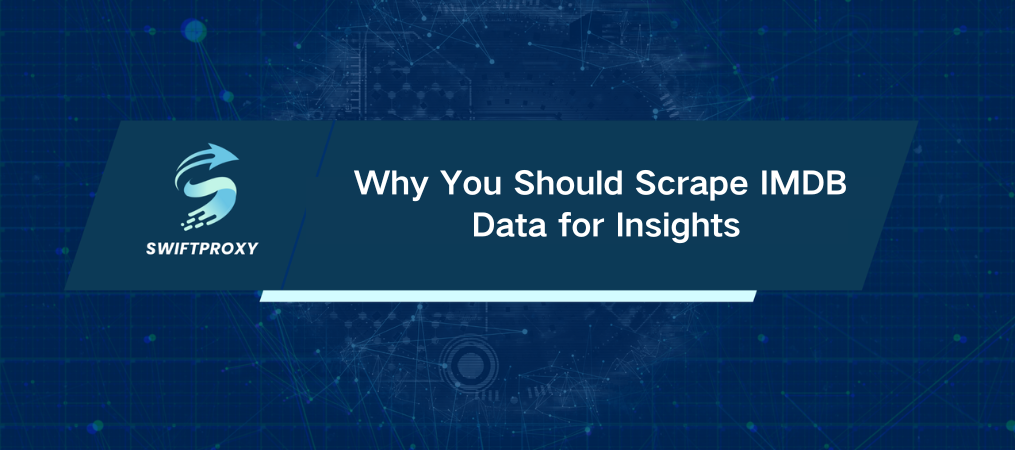Why You Should Scrape IMDB Data for Insights

The world of movies is vast, and there's no better place to dive in than IMDB's Top 250 list. Whether you're conducting research, building a recommendation engine, or simply satisfying your curiosity, scraping data from IMDB can provide valuable insights. Here's how you can extract that treasure trove of movie details using Python.
Why Scrape IMDB Data
IMDB is packed with useful details—ratings, genres, movie summaries, and much more. For developers, researchers, or movie buffs, this data can be gold. With Python's flexibility, you can extract, manipulate, and analyze this data in a heartbeat.
Before we get started, a quick word of caution: Scraping websites like IMDB can sometimes raise red flags. To stay under the radar, you'll need to mimic human browsing patterns. Don't worry. I'll walk you through how to do that effectively.
Step 1: Getting Scraper Ready
Let's break down the essential tools. In this tutorial, we'll use Python's requests library for fetching the page, lxml for parsing HTML, and json (when necessary) for handling structured data. First, let's install the required libraries.
Installing Libraries
Open your terminal and run this command:
pip install requests lxml
This will install everything you need to get started.
Configuring Your Headers
To make your scraper appear more like a real user (and avoid getting blocked), you must configure your request headers. These headers tell IMDB that your request is coming from a legitimate browser.
Here's an example of what those headers might look like:
import requests
headers = {
'accept': 'text/html,application/xhtml+xml,application/xml;q=0.9,image/avif,image/webp,image/apng,/;q=0.8,application/signed-exchange;v=b3;q=0.7',
'accept-language': 'en-IN,en;q=0.9',
'cache-control': 'no-cache',
'dnt': '1',
'pragma': 'no-cache',
'sec-ch-ua': '"Google Chrome";v="129", "Not=A?Brand";v="8", "Chromium";v="129"',
'user-agent': 'Mozilla/5.0 (X11; Linux x86_64) AppleWebKit/537.36 (KHTML, like Gecko) Chrome/129.0.0.0 Safari/537.36',
}
This header mimics a real browser's request, which helps you avoid getting flagged by IMDB's anti-scraping mechanisms.
Step 2: Sending Your Request
Once the headers are set, you can send your request to IMDB's Top 250 list. For larger scraping tasks, it's a good idea to spread your requests across multiple IP addresses using proxies (more on that later).
response = requests.get('https://www.imdb.com/chart/top/', headers=headers)
Step 3: Extracting Data from HTML Content
The next step is to parse the HTML response and extract the structured data (usually in JSON-LD format). IMDB makes it easy by embedding movie details inside a <script> tag. We'll use lxml to extract this data.
from lxml.html import fromstring
import json
parser = fromstring(response.text)
# Extract the JSON-LD data (structured data)
raw_data = parser.xpath('//script[@type="application/ld+json"]/text()')[0]
json_data = json.loads(raw_data)
Step 4: Pulling Movie Information
Now that we have the structured data in JSON format, we can loop through it and extract key details such as movie names, ratings, genres, and descriptions.
Here's the code that does that:
movies_details = json_data.get('itemListElement')
movies_data = []
for movie in movies_details:
item = movie['item']
movie_data = {
'name': item['name'],
'description': item['description'],
'rating': item['aggregateRating']['ratingValue'],
'genres': item['genre'],
'url': item['url'],
'image': item['image'],
'duration': item['duration']
}
movies_data.append(movie_data)
Step 5: Storing Extracted Data
Once we've extracted the data, we'll store it in a CSV file for further analysis. We'll use pandas for this. If you don't have pandas installed, run:
pip install pandas
Then, save the extracted data to a CSV file:
import pandas as pd
# Convert to DataFrame and save to CSV
df = pd.DataFrame(movies_data)
df.to_csv('imdb_top_250_movies.csv', index=False)
print("IMDB Top 250 movies data saved to imdb_top_250_movies.csv")
Full Code Overview
Here's how the entire script looks when put together:
import requests
from lxml.html import fromstring
import json
import pandas as pd
# Define headers
headers = {
'accept': 'text/html,application/xhtml+xml,application/xml;q=0.9,image/avif,image/webp,image/apng,/;q=0.8,application/signed-exchange;v=b3;q=0.7',
'user-agent': 'Mozilla/5.0 (X11; Linux x86_64) AppleWebKit/537.36 (KHTML, like Gecko) Chrome/129.0.0.0 Safari/537.36',
}
# Send request
response = requests.get('https://www.imdb.com/chart/top/', headers=headers)
# Parse HTML
parser = fromstring(response.text)
raw_data = parser.xpath('//script[@type="application/ld+json"]/text()')[0]
json_data = json.loads(raw_data)
# Extract movie details
movies_details = json_data.get('itemListElement')
movies_data = []
for movie in movies_details:
item = movie['item']
movie_data = {
'name': item['name'],
'description': item['description'],
'rating': item['aggregateRating']['ratingValue'],
'genres': item['genre'],
'url': item['url'],
'image': item['image'],
'duration': item['duration']
}
movies_data.append(movie_data)
# Save data to CSV
df = pd.DataFrame(movies_data)
df.to_csv('imdb_top_250_movies.csv', index=False)
print("IMDB Top 250 movies data saved to imdb_top_250_movies.csv")
Consider Ethical Scraping Practices
While scraping is powerful, it's also important to play by the rules:
1. Adhere to robots.txt: Check IMDB's robots.txt file to see what is allowed for scraping. Always follow the guidelines.
2. Prevent Server Overload: Don't bombard the site with requests. Use delays between requests if scraping large amounts of data.
3. Follow Terms of Service: Ensure that you're not violating IMDB's terms of service. Scrape responsibly and for legitimate purposes.
Conclusion
You now have a working Python scraper that pulls data from IMDB's Top 250 movies. With this script, you can easily modify it for other web scraping tasks or extend it to fetch more detailed movie information. Remember, scraping is a skill, but it comes with responsibility. Use it wisely, and you'll unlock many possibilities for gathering valuable data.

















































